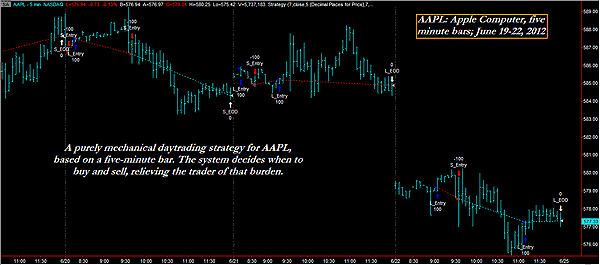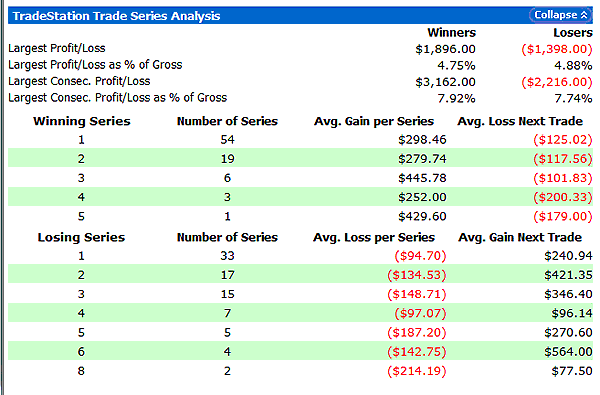
HOT TOPICS LIST
- MACD
- Fibonacci
- RSI
- Gann
- ADXR
- Stochastics
- Volume
- Triangles
- Futures
- Cycles
- Volatility
- ZIGZAG
- MESA
- Retracement
- Aroon
INDICATORS LIST
LIST OF TOPICS
PRINT THIS ARTICLE
by Donald W. Pendergast, Jr.
Your personal trading beliefs will determine if you're better suited for mechanical system trading or discretionary trading. Find out which style is the best fit for your trading endeavors.
Position: N/A
Donald W. Pendergast, Jr.
Donald W. Pendergast is a financial markets consultant who offers specialized services to stock brokers and high net worth individuals who seek a better bottom line for their portfolios.
PRINT THIS ARTICLE
System Or Discretionary Trading?
06/28/12 08:40:22 AMby Donald W. Pendergast, Jr.
Your personal trading beliefs will determine if you're better suited for mechanical system trading or discretionary trading. Find out which style is the best fit for your trading endeavors.
Position: N/A
| It can take newer traders some time to sort out just what they hope to accomplish as they trade and/or invest in the financial markets. For many, the more they learn about the markets, the more confusing it can be as they seek to separate the wheat from the chaff in their quest to extract profits from the markets on a regular basis. But if you take a little time to consider and then answer these questions, you may find it easier to focus on what really matters: 1. Am I an extremely busy person, perhaps with an ever-changing work schedule or many variable demands on my time that will prevent me from being able to watch the markets in real time and/or performing daily chart and market analysis after the close of trading? 2. Am I comfortable with allowing an intelligently designed, well-tested mechanical trading system to make trading decisions for me, thus relieving me of the duty of deciding which trade setups to take -- and which to reject? 3. Am I a skilled market analyst and technician, able to combine a variety of technical, fundamental, and sentiment inputs in order to arrive at consistently profitable trading results without relying on an objective mechanical system? 4. Am I the kind of trader who wants the core of my trading regimen to be based on the type of mechanical system described in question 2, but still desiring to filter the output of such a system by looking at all applicable technical, fundamental, and/or sentiment data that may help me operate my mechanical system with the assistance of my own God-given common sense? See Figures 1 and 2. |

|
| FIGURE 1: AAPL, FIVE-MINUTE. With a purely mechanical system, the computer makes all of the trading decisions. For some traders, this makes trading less stressful. Discretionary trading can still be useful at times, particularly in extreme market conditions. |
| Graphic provided by: TradeStation. |
| |
| When you really think about it, what you've just read in questions 1-4 pretty much describes the way most traders operate. The problems start when they start out as a purely mechanical trader and start to have a losing streak, panic after three losses, and then decide to become a purely discretionary trader, panic again after three or four more losses, and then start looking for some market guru's stock trading letter, somehow thinking that the guru has all the answers and then -- surprise -- they have losing trades there, too, and finally come to their wit's end. When real money that took you years to earn and save up is on the line in the markets, the last thing you need is a lack of confidence in your trading method, because it will cause you to jump from method to method without ever allowing you to enjoy any consistent measure of trading success. |

|
| FIGURE 2: TRADE SERIES ANALYSIS. With a backtested mechanical system, you can at least get an idea of how the systems internal coding affects its output. This system tends to have large average winning trades after a string of losing trades across this particular six-month data period. |
| Graphic provided by: TradeStation. |
| |
| From my own experience, I have discovered that I make more money and hold onto more of those gains when I trade a purely mechanical model, with no discretionary judgment applied at all. In the past, I've attempted to rely on price/earnings ratios, dividend yields, seasonal charts, and more, but time after time I find that those kinds of filters applied to my stock and exchange traded fund (ETF) trading add little or no value to my mechanical system models. So in most cases, I simply don't spend any time on adding such filters to my systems anymore and just stick with what my well-designed and tested systems tell me to do and then simply run with it. My trading is far more stress-free and more profitable now, and I don't think I would ever go back to a discretionary or partly discretionary trading model ever again. This is not to say that there aren't times when trading from a discretionary angle isn't desirable. Indeed, when I bought silver (5,000 ounces of real metal, not futures contracts) in 2003 at an average price of less than $5.40 per ounce, it was based on a purely fundamental and market psychology evaluation. While I sold that position long before April 2011's manic highs, I still did pretty well. However, apart from once-in-a-generation buying opportunities like that one, my trading now is simply going to be by way of proven, 100% mechanical trading systems of my own design. |
| Here's a final analogy that you may find useful, especially if you're a fan of popular music. I play lead guitar in a local band, and as I rehearse the songs (based on classic rock, blues, and country-based styles), I need to decide if the guitar solos on any given song are to be played free-form in the key of the song, making it up as I go along, drawing from an extensive skill set of licks, riffs, and melodic phrases that I've acquired since the late 1970s, or if I am going to create and then memorize the solo, note for note, playing it exactly the same way, performance after performance. Not only that, I have to decide which guitar I will use on any given number -- the Flying V for the more aggressive rock tunes or the Telecaster for the more bluesy and country-style songs. To apply this to the world of trading, when I go the free-form solo route, I am using a discretionary method, one that has some basic guidelines (the key of the song and the available scales in that key). When I play the note-for-note recreation of the song, exactly the same way time after time, I am using a systematic method of playing. While the free-form method does at times yield sonically pleasing results, it is still an experiment, one in which the listener's ears will decide if it was a memorable musical moment. On the other hand, playing a memorized solo note for note -- and one that prior audiences have shown great delight in -- is much less stressful and usually results in a much better, more consistent listening experience for everyone involved, including my bandmates. |
| You may find this analogy helpful as you decide whether the systematic or discretionary style of trading will be more effective as you seek to consistently make money in the financial markets. Both methods have their advantages and drawbacks, so consider your own unique trading psychology as you choose your own trading methodology. Just remember that free-form or discretionary trading can at times be unpredictable, since you only have the most basic of guidelines to direct your trading. Systematic trading allows you to repeat the same basic trading protocol and is usually less stressful. For some traders, it also allows them added staying power, especially if they have confidence in such objective methods. Follow the music in your heart and always be in harmony with what it tells you to do, and your trading should be more satisfying, no matter which pathway you take in trading -- and in life. |
Donald W. Pendergast is a financial markets consultant who offers specialized services to stock brokers and high net worth individuals who seek a better bottom line for their portfolios.
| Title: | Writer, market consultant |
| Company: | Linear Trading Systems LLC |
| Jacksonville, FL 32217 | |
| Phone # for sales: | 904-239-9564 |
| E-mail address: | lineartradingsys@gmail.com |
Traders' Resource Links | |
| Linear Trading Systems LLC has not added any product or service information to TRADERS' RESOURCE. | |
Click here for more information about our publications!
Comments

Request Information From Our Sponsors
- StockCharts.com, Inc.
- Candle Patterns
- Candlestick Charting Explained
- Intermarket Technical Analysis
- John Murphy on Chart Analysis
- John Murphy's Chart Pattern Recognition
- John Murphy's Market Message
- MurphyExplainsMarketAnalysis-Intermarket Analysis
- MurphyExplainsMarketAnalysis-Visual Analysis
- StockCharts.com
- Technical Analysis of the Financial Markets
- The Visual Investor
- VectorVest, Inc.
- Executive Premier Workshop
- One-Day Options Course
- OptionsPro
- Retirement Income Workshop
- Sure-Fire Trading Systems (VectorVest, Inc.)
- Trading as a Business Workshop
- VectorVest 7 EOD
- VectorVest 7 RealTime/IntraDay
- VectorVest AutoTester
- VectorVest Educational Services
- VectorVest OnLine
- VectorVest Options Analyzer
- VectorVest ProGraphics v6.0
- VectorVest ProTrader 7
- VectorVest RealTime Derby Tool
- VectorVest Simulator
- VectorVest Variator
- VectorVest Watchdog
